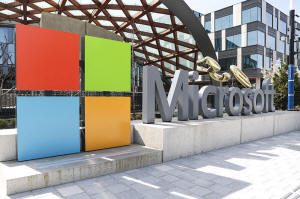Microsoft says it's 'slowing or pausing' some AI data center projects,
including $1B plan for Ohio
[April 10, 2025] By
MATT O'BRIEN
Microsoft said it is “slowing or pausing” some of its data center
construction, including a $1 billion project in Ohio, the latest sign
that the demand for artificial intelligence technology that drove a
massive infrastructure expansion might not need quite as many powerful
computers as expected.
The tech giant confirmed this week that it is halting early-stage
projects on rural land it owns in central Ohio's Licking County, outside
of Columbus, and will reserve two of the three sites for farmland.
“In recent years, demand for our cloud and AI services grew more than we
could have ever anticipated and to meet this opportunity, we began
executing the largest and most ambitious infrastructure scaling project
in our history,” said Noelle Walsh, the president of Microsoft's cloud
computing operations, in a post on LinkedIn.
Walsh said “any significant new endeavor at this size and scale requires
agility and refinement as we learn and grow with our customers. What
this means is that we are slowing or pausing some early-stage projects.”
Microsoft didn't say Wednesday what other projects it has slowed outside
of Ohio, but in late December it revealed it was pausing the later
phases of a large data center project in Wisconsin.

Analysts with TD Cowen reported earlier this year that Microsoft was
also scaling back some of its international data center expansion and
canceling some leases in the U.S. for use of data centers operated by
other companies.
Other analysts for months have tied some of the changes to a shift in
Microsoft's close relationship with its business partner OpenAI, maker
of ChatGPT.
“OpenAI was moving in one direction” by prioritizing the development of
more advanced AI systems, which require vast computing resources to
train on troves of data, while “Microsoft may not have been moving that
same direction,” said Craig Ellis, director of research at B. Riley
Securities.
The two companies announced on Jan. 21 that they were altering the
agreement that had made Microsoft the exclusive provider of OpenAI's
computing power, enabling the smaller company to build its own capacity,
“primarily for research and training of models.” It was the same day
that newly inaugurated President Donald Trump touted OpenAI's
partnership with Oracle and SoftBank to pledge $500 billion in new AI
infrastructure in the U.S., starting with a data center in Texas.
[to top of second column] |

A Microsoft sign and logo are pictured at the company's
headquarters, Friday, April 4, 2025, in Redmond, Wash. (AP
Photo/Jason Redmond)
 Microsoft has long built data
centers around the world to run its cloud computing services. The
generative AI boom accelerated the demand for such facilities, both
to train new AI systems and to keep them running as millions of
people start using chatbots and other AI tools at work and home.
The computing it takes to run AI tools is expensive and requires a
large amount of electricity — so much so that Trump this week cited
AI needs as part of the justification for using his emergency
authorities to boost the declining U.S. coal industry, a reliable
but polluting energy source. Tech companies have also sought to tap
into nuclear power, including a proposed Microsoft-backed revival of
the shuttered Three Mile Island plant in Pennsylvania, which would
feed an electricity grid supplying data centers in Ohio as well as
Virginia, the nation's biggest data center hub.
Microsoft said it still plans to spend more than $80 billion
globally to expand its AI infrastructure this fiscal year, which
ends in June, and has already doubled its data center capacity over
the past three years.
“While we may strategically pace our plans, we will continue to grow
strongly and allocate investments that stay aligned with business
priorities and customer demand,” Walsh said.
The Ohio pause nevertheless came as a disappointment to local
officials.
Licking County has also attracted data center investments from
Microsoft rivals Google and Meta Platforms and a highly anticipated
semiconductor factory from Intel, though the struggling chipmaker in
February pushed back the expected completion date for the project's
first stage to 2030.
All contents © copyright 2025 Associated Press. All rights reserved
 |